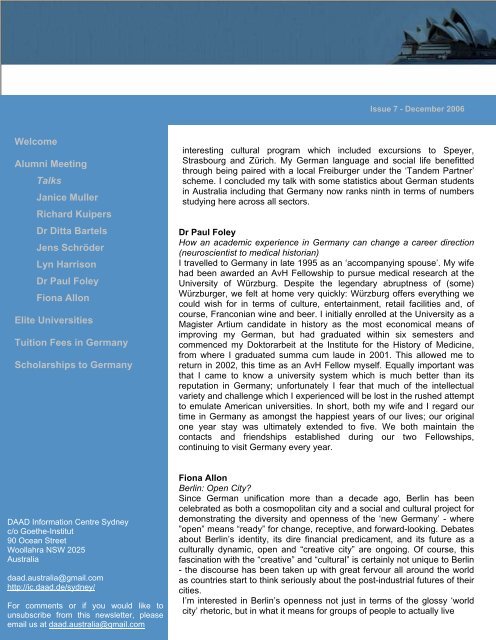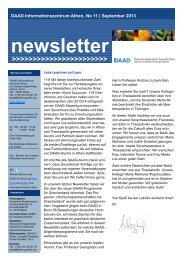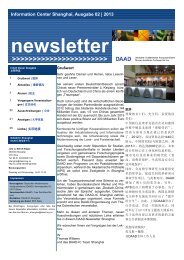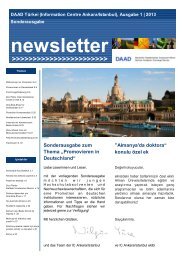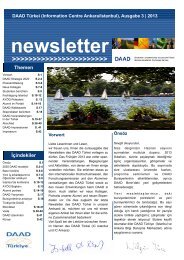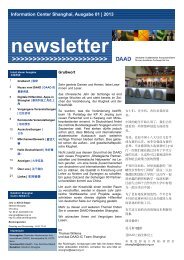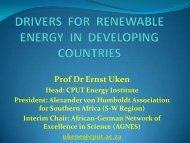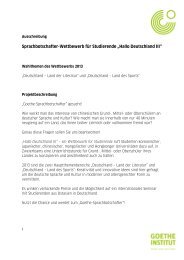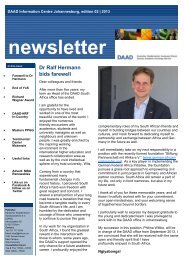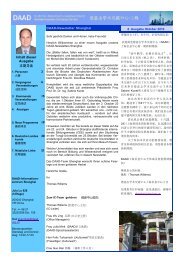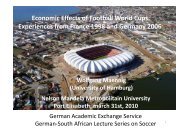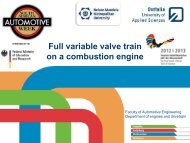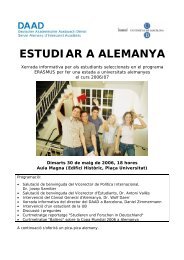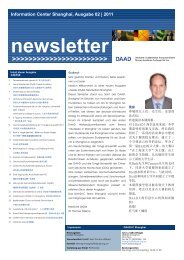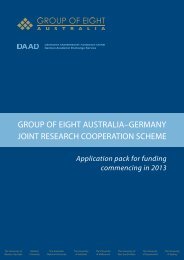Issue 7, December 2006 - DAAD
Issue 7, December 2006 - DAAD
Issue 7, December 2006 - DAAD
You also want an ePaper? Increase the reach of your titles
YUMPU automatically turns print PDFs into web optimized ePapers that Google loves.
<strong>Issue</strong> 7 - <strong>December</strong> <strong>2006</strong><br />
Welcome<br />
Alumni Meeting<br />
Talks<br />
Janice Muller<br />
Richard Kuipers<br />
Dr Ditta Bartels<br />
Jens Schröder<br />
Lyn Harrison<br />
Dr Paul Foley<br />
Fiona Allon<br />
Elite Universities<br />
Tuition Fees in Germany<br />
Scholarships to Germany<br />
interesting cultural program which included excursions to Speyer,<br />
Strasbourg and Zürich. My German language and social life benefitted<br />
through being paired with a local Freiburger under the ‘Tandem Partner’<br />
scheme. I concluded my talk with some statistics about German students<br />
in Australia including that Germany now ranks ninth in terms of numbers<br />
studying here across all sectors.<br />
Dr Paul Foley<br />
How an academic experience in Germany can change a career direction<br />
(neuroscientist to medical historian)<br />
I travelled to Germany in late 1995 as an ‘accompanying spouse’. My wife<br />
had been awarded an AvH Fellowship to pursue medical research at the<br />
University of Würzburg. Despite the legendary abruptness of (some)<br />
Würzburger, we felt at home very quickly: Würzburg offers everything we<br />
could wish for in terms of culture, entertainment, retail facilities and, of<br />
course, Franconian wine and beer. I initially enrolled at the University as a<br />
Magister Artium candidate in history as the most economical means of<br />
improving my German, but had graduated within six semesters and<br />
commenced my Doktorarbeit at the Institute for the History of Medicine,<br />
from where I graduated summa cum laude in 2001. This allowed me to<br />
return in 2002, this time as an AvH Fellow myself. Equally important was<br />
that I came to know a university system which is much better than its<br />
reputation in Germany; unfortunately I fear that much of the intellectual<br />
variety and challenge which I experienced will be lost in the rushed attempt<br />
to emulate American universities. In short, both my wife and I regard our<br />
time in Germany as amongst the happiest years of our lives; our original<br />
one year stay was ultimately extended to five. We both maintain the<br />
contacts and friendships established during our two Fellowships,<br />
continuing to visit Germany every year.<br />
<strong>DAAD</strong> Information Centre Sydney<br />
c/o Goethe-Institut<br />
90 Ocean Street<br />
Woollahra NSW 2025<br />
Australia<br />
daad.australia@gmail.com<br />
http://ic.daad.de/sydney/<br />
For comments or if you would like to<br />
unsubscribe from this newsletter, please<br />
email us at daad.australia@gmail.com<br />
Fiona Allon<br />
Berlin: Open City?<br />
Since German unification more than a decade ago, Berlin has been<br />
celebrated as both a cosmopolitan city and a social and cultural project for<br />
demonstrating the diversity and openness of the ‘new Germany’ - where<br />
”open” means “ready” for change, receptive, and forward-looking. Debates<br />
about Berlin’s identity, its dire financial predicament, and its future as a<br />
culturally dynamic, open and “creative city” are ongoing. Of course, this<br />
fascination with the “creative” and “cultural” is certainly not unique to Berlin<br />
- the discourse has been taken up with great fervour all around the world<br />
as countries start to think seriously about the post-industrial futures of their<br />
cities.<br />
I’m interested in Berlin’s openness not just in terms of the glossy ‘world<br />
city’ rhetoric, but in what it means for groups of people to actually live


